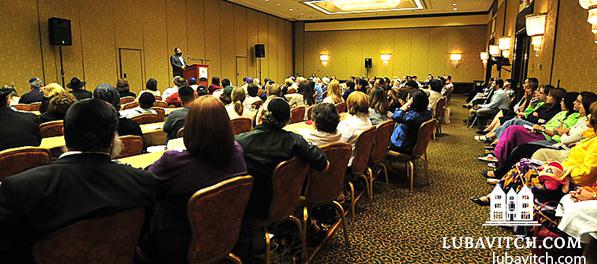(lubavitch.com) The Rebbe intended for all of us to be leaders, not followers,” Mr. George Rohr charged a packed hall at the Hyatt Regency in Greenwich, Connecticut. “We may not understand the power we have to impact the world, but it is up to all of us to make this world heavenly. We can’t leave it to the teachers and rabbis.”
The call to action summed up the general sentiment at the Rohr Jewish Learning Institute’s fourth annual retreat, which ended Sunday. Though attendees undoubtedly came to soak up as much wisdom as possible, their purpose was greater than hitting the books.
“People leave the convention with a greater commitment to Judaism and are inspired by the global learning community they are a part of,” explains the retreat’s director, Rabbi Yoni Katz. “It is no longer ‘just me and my rabbi studying together;’ people realize they are part of something much bigger.”
That something is the world’s largest and most comprehensive source of adult Jewish education. JLI courses, taught in 300 cities, are well-regarded classes covering Jewish law, history, and philosophy. Once a year, its most dedicated students gather for a five-day intensive study retreat.
With almost 600 attendees, this year’s assembly brought together more participants than all three previous retreats combined. It was a stunning success in numbers, certainly, but also in the breadth of speakers, topics, and themes.
“We gathered the best of the best teachers, and we offer a range of classes, ensuring that there is something to interest everyone,” explains Katz.
A provocative exploration of the women’s role in the synagogue and the value of the mikvah; a historical review of early American Jewry or the history of the Bielsky brothers; hands-on scribal, challah, and Shabbat cooking workshops; Bible criticism or live panel debates on Jewish law; and meditative hikes and prayer introductions, were a few of the week’s offerings. In all, 52 eminent scholars presented over 100 different classes.
Margaret Freiberg is a retired lawyer living in Greenwich. Though she attends services at her local Chabad center, this was her first foray into JLI.
“I am really very impressed. A lot of conferences I have attended have a lot of dead time. This has been nonstop study from before breakfast until after 10 pm. The quality of speakers is very high and the questions from the audience are quite good.”
During Thursday’s session entitled, “The Jewish Survival Game,” Dr. Stephen Serbin quizzed participants on their first Jewish memories before asking them to choose the rudiments of Jewish continuity. Participants deliberated the importance of the 20 listed items; the discrepancies of the end results proved how varied the Jewish community is. Serbin usually presents the game to Jewish federations or local boards. The answers, he says, are always different.
But attending this retreat, which he does each year, helps promote Jewish awareness, according to this South Carolina family practitioner.
“We can’t only learn how to be Jewish, we must learn why to be Jewish,” believes Serbin. “Following each retreat I ratchet up my Judaism a little bit. After another 20 or 30 of them, I may be religious!”
The confluence of modernity and religiosity surfaced in several lectures.
During Rabbi Yona Reiss’ discussion on “Religion and Law at Crossroads,” a lively debate ensued over the impact that government and religion have on each other and the inevitable ramifications. A lawyer and rabbi, Reiss is the dean of the Rabbi Isaac Elchanan Theological Seminary at Yeshiva University in New York City. He explained that Americans have an enviable position in which “they have a constitutional right to a lack of religious interference from the country.” Unlike other nations, past and present, “American law does not encroach.”
“Ber Manischewitz’s advertisements told people that they could subscribe to the highest values of Judaism and still live in America,” explained Brandeis professor Dr. Jonathan Sarna.
The chief historian of the National Museum of American Jewish History, Sarna focused one of his classes on the history of Manischewitz and the Americanization of matzah. He explained that Manischewitz happened on the American scene just as demand for matzah was skyrocketing (due to a significant influx of immigrants) and industrialization was sweeping the world of manufacturing. His machine-made, square matzah quickly became the gold standard; by the 1920s, 80 percent of all matzah sold in America was his.
“In two generations,” says Sarna, “matzah-making was turned on its head. It is a triumph of the idea that modernity and tradition can be harmonized.”
In synagogue study halls and college campuses, JLI courses prove that ancient religion of their students meshes with their modern lives. Rachel Fertel and 90 other Sinai Scholars attended the convention, courtesy of the Rohr family. Sinai Scholars presents Jewish study opportunities to college students worldwide.
“It allows people to explore their Judaism and gives a campus the chance to do good,” says Fertel, a graduate of NYU. “It is both a learning comfort zone and a network for Jewish students who wish to come together.”
Rohr congratulated the students’ achievements during Thursday’s gala dinner, calling them his “personal heroes.” He addressed the broader audience with a strong appeal.
“This retreat is deceptive. You may think it is a great opportunity to take, to learn, to reflect. There’s a feeling that it’s all about me. That is not entirely the case. It is all about you in a different way—it is all about empowering you to go out and create new worlds. We are meant to become delegates, not so much students, but delegates of Torah.”

Be the first to write a comment.